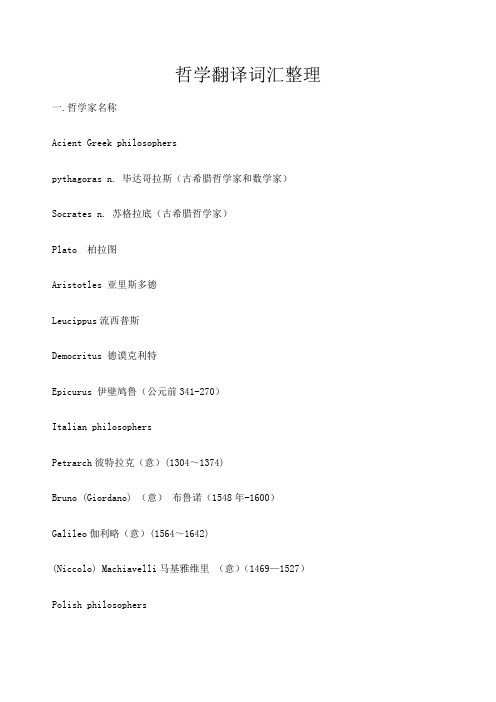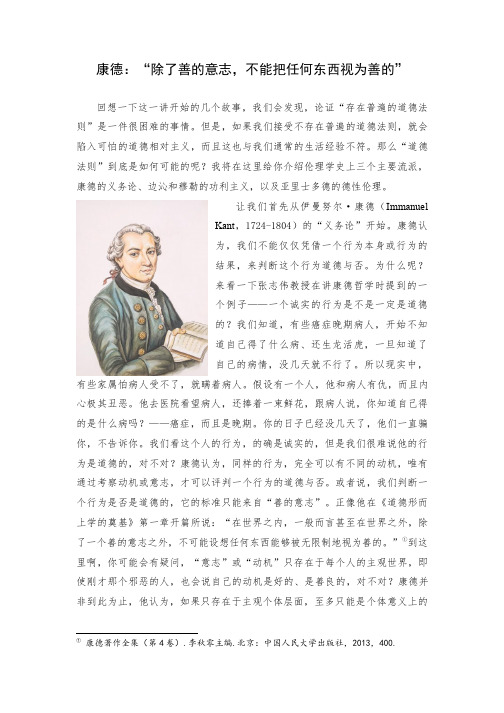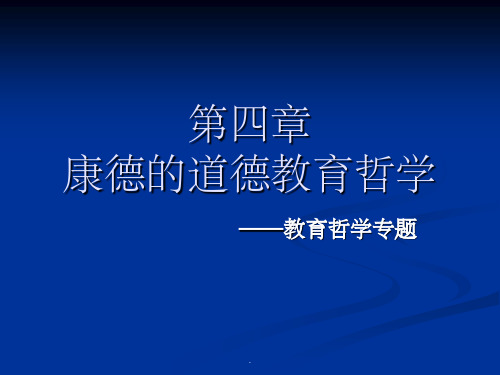康德社会哲学翻译
[《康德三大批判精粹》的翻译理念] 康德哲学的主要观点
![[《康德三大批判精粹》的翻译理念] 康德哲学的主要观点](https://img.taocdn.com/s3/m/e9d5ca2ac8d376eeafaa31b2.png)
《[《康德三大批判精粹》的翻译理念] 康德哲学的主要观点》杨祖陶和邓晓芒两位先生编译的《康德三大批判精粹》由人民出版社出版了。
恰逢其时,我对康德哲学兴味正浓。
在把杨、邓两位先生所编译的《精粹》后半部即《实践理性批判》和《判断力批判》的精粹读完后,颇有所思,乃是关于翻译的,兹记于后。
按此书后记,精粹全部译文均由邓晓芒先生据德文本译出,又由杨祖陶先生逐一校订之。
我以为,精粹本所体现出的翻译理念,对于我们应当如何恰当地引译西方哲学原典这一问题,给出了一个颇具特色而又富启发性的回答。
可概括为两点。
特色之一,译者试图实现译文�汉语�与原文�德文�在句法结构上的对应。
译文应当忠实地表达原文的义理,这乃是译界的公论,舍此恐怕也谈不上什么翻译了。
所谓“信”、“达”也。
译界的另一似乎已成为“公论”的要求,便是“雅”。
就是说,在翻译中,考虑到译文�汉语�与原文�如德文�之间的语法不同,翻译应当灵活而忌死板。
西方哲学文献中往往会出现一些构造很复杂却又不失逻辑的简明与严格的、有时候长达一整段话的长句,而汉语又被认为是“不适合于”构造长句的,所以,在把长句式的西文译成汉语时,尤其需要通过一些翻译技巧,将其拆成几个句子,以使其合乎汉语的“习惯”。
这一观念在精粹本中可说是受到挑战。
比照一下同样是据德文原本所译出的《判断力批判》的宗白华译本和精粹本,不同之处是显著的:同样一段话,宗译本有时需两三句才译出,而精粹本却能做到只用一句译出。
这说明了什么?这并非一个翻译的可能性问题,因为精粹本已经做出了回答:汉语同样可以做到与西文对应的既不失逻辑的清晰又体现句式的庞杂繁冗的表达。
这也不是一个在语言上的翻译能力高低的问题:老一辈学者们治学的严谨和西语功底的深厚,是人们有目共睹的。
两种译本间的差别,乃是各自所持翻译理念不同的表现,而两者翻译理念的不同,在我看来,其实是对于思想内容与语言形式之关系的不同理解造成的。
我们可以问,那使人们感到艰涩沉重�甚至矫揉造作�的,也因而译家们想要“雅”起来的东西是什么?仅仅只是西语的长句式吗?的确,西语是能构造长句式的,但问题在于:它也不只是长句式的。
哲学专业的英文名词

哲学专业的英文名词
1. Metaphysics(形上学):研究存在、实体和本质的学科,探讨现实的本质和不可见的现象。
2. Epistemology(认识论):研究知识的起源、性质、限度和验证方法的学问。
3. Ethics(伦理学):研究道德原则和价值观的学科,探讨如何判断行为的对错以及如何做出道德决策。
4. Logic(逻辑学):研究与推理和论证相关的规则和原则的学科,帮助我们理性思考和辨别谬误。
5. Aesthetics(美学):研究艺术、美和审美经验的学问,探讨美的本质和艺术的功能。
6. Philosophy of Mind(心灵哲学):研究意识、心灵和思维的学科,涉及到意识的起源、本质和关系。
7. Philosophy of Science(科学哲学):研究科学方法和科学知识的起源和本质的学科。
8. Political Philosophy(政治哲学):研究政治权力、公正和社会秩序的学问。
这些是哲学专业中的一些常见英文名词,涵盖了不同领域的研究。
对于想要深入了解哲学的人来说,理解这些名词是很重要的。
在学术研究和讨论中,使用正确的英文术语可以提高交流的准确性和清晰度。
注意:以上内容仅供参考,具体术语使用请根据具体情况和相关权威资源进行确认。
哲学翻译词汇

哲学翻译词汇整理一.哲学家名称Acient Greek philosopherspythagoras n. 毕达哥拉斯(古希腊哲学家和数学家)Socrates n. 苏格拉底(古希腊哲学家)Plato 柏拉图Aristotles 亚里斯多德Leucippus流西普斯Democritus 德谟克利特Epicurus 伊壁鸠鲁(公元前341-270)Italian philosophersPetrarch彼特拉克(意)(1304~1374)Bruno (Giordano) (意)布鲁诺(1548年-1600)Galileo伽利略(意)(1564~1642)(Niccolo) Machiavelli马基雅维里(意)(1469—1527)Polish philosophersCopernicus哥白尼(波兰)(1473~1543)German philosophersKant: 康德(德)Nietzsche n. 尼采(德,1844-1900) (Ludwig) Feuerbach 费尔巴哈(Arthur) Schopenhauer 叔本华Hegel: 黑格尔, Hegelian,黑格尔的The Young Hegelians 青年黑格尔学派Marx 马克思Engels 恩格斯English and Scottish philosophers Francis Bacon 培根(英)(1561—1626)John Locke 洛克(英)Thomas Hobbes托马斯.霍布斯(英)Adam Smith 亚当.斯密斯(苏格兰)David Hume 休谟(苏格兰)Thomas Malthus托马斯.马尔萨斯Isaac Newton艾萨克.牛顿(Bertrand) Russell 罗素Ricardo 李嘉图French Philosophers(Rene) Descartes笛卡尔(法)Cartesian adj.笛卡尔的(Baruch) Spinoza 斯宾诺莎(法)(Denis) Diderot 狄德罗(法)(Charles) Montesquieu 孟德斯鸠(法)(1689年至1755年),(Francois) Voltaire 弗朗索瓦伏尔泰(法)(1694-1778),(Jean-Jacques) Rousseau 卢梭(法)(1712-1778)Claude-Henri Saint-Simon 克劳德.圣西门(1760年至1825年)Francois Charles Fourier弗朗索瓦.查尔斯.傅立叶(1772年至1837年)Jean-Paul Sartre 萨特Danish philosopherskierkegaard:n. 齐克果American philosophersJohn Dewey 杜威(美). Skinner 斯金纳(美)Talcott Parsons 帕森斯Chinese philosophersConfucius:孔子Lao Tzu: 老子Chuang Tzu 庄子二. 哲学流派philosophical sects 哲学学派Greek Philosophy 希腊哲学Arabian Philosophy 阿拉伯哲学German classical idealist philogophy:德国古典唯心主义哲学Classical German Philosophy德国古典哲学French Socialism法国的社会主义British Political Economy英国的政治经济学Marxist philosophy 马克思主义哲学empirical philosophy 经验哲学materialism: 唯物主义。
社会伦理学中的康德主义观点

社会伦理学中的康德主义观点康德主义观点是社会伦理学中重要的一部分,主要强调道德行为应该基于理性和普遍性的原则。
这种观点由德国哲学家康德提出,对今天的道德和社会议题仍然具有指导意义。
康德主义观点认为人的行为应该遵循伦理规范,不仅仅是出于自身的利益考量,而是建立在道德的基础上。
康德主义强调人的自由意志和理性使得每个人都有责任去追求“善”的行为。
康德认为,我们通过理智的思考,可以发现一个普遍适用的“道德律”,这个律法被称为“卡凡德律”。
按照卡凡德律,一个行为只有在它的普遍适用性下才能被视为道德行为。
也就是说,一个人的行为只有在不适摄他人自由和权利的情况下才能被视为道德行为。
这就是康德主义强调的普遍性原则。
这个原则是基于康德对人的尊严的重视,他认为每个人都应该被看作是独立和自由的个体,有着独立的思考和决策能力。
基于这个原则,康德主义对一些社会伦理问题提出了独特的观点。
例如,康德主义强调人的行为应该遵循普遍的道德准则,因此反对利用他人的痛苦和苦难来谋取自己的利益的行为。
这就解释了为什么康德主义反对虐待动物、贫富差距过大等社会不公平现象。
康德主义认为,每个人都应该被平等对待,只有这样才能实现正义和道义。
此外,康德主义还强调了个体的责任和义务。
根据康德主义观点,每个人都有责任和义务去追求道德的行为。
这就要求人们在决策和行为中要考虑到他人的利益和福祉。
这也是康德主义对于慈善事业和社会公益的重视。
康德主义认为,个体的行为应该以维护社会整体的福利为目标,而不仅仅是满足自己的私利。
这种道德观念在今天的社会中仍然具有重要的意义。
然而,康德主义观点也存在一些争议。
有人认为,康德主义的普遍性原则并不适用于所有情况。
例如,在一些紧急情况下,个体可能需要违背普遍准则来拯救他人的生命。
康德主义在这方面的局限性就显现出来了。
另外,康德主义观点在实践中也不容易落实,因为个体的利益和欲望经常与道德行为发生冲突,这就需要个体在日常生活中进行道德选择。
哲学导论——何谓“道德”——如何过上“好”的生活 (1)

康德:“除了善的意志,不能把任何东西视为善的”回想一下这一讲开始的几个故事,我们会发现,论证“存在普遍的道德法则”是一件很困难的事情。
但是,如果我们接受不存在普遍的道德法则,就会陷入可怕的道德相对主义,而且这也与我们通常的生活经验不符。
那么“道德法则”到底是如何可能的呢?我将在这里给你介绍伦理学史上三个主要流派,康德的义务论、边沁和穆勒的功利主义,以及亚里士多德的德性伦理。
让我们首先从伊曼努尔·康德(ImmanuelKant,1724-1804)的“义务论”开始。
康德认为,我们不能仅仅凭借一个行为本身或行为的结果,来判断这个行为道德与否。
为什么呢?来看一下张志伟教授在讲康德哲学时提到的一个例子——一个诚实的行为是不是一定是道德的?我们知道,有些癌症晚期病人,开始不知道自己得了什么病、还生龙活虎,一旦知道了自己的病情,没几天就不行了。
所以现实中,有些家属怕病人受不了,就瞒着病人。
假设有一个人,他和病人有仇,而且内心极其丑恶。
他去医院看望病人,还捧着一束鲜花,跟病人说,你知道自己得的是什么病吗?——癌症,而且是晚期。
你的日子已经没几天了,他们一直骗你,不告诉你。
我们看这个人的行为,的确是诚实的,但是我们很难说他的行为是道德的,对不对?康德认为,同样的行为,完全可以有不同的动机,唯有通过考察动机或意志,才可以评判一个行为的道德与否。
或者说,我们判断一个行为是否是道德的,它的标准只能来自“善的意志”。
正像他在《道德形而上学的奠基》第一章开篇所说:“在世界之内,一般而言甚至在世界之外,除了一个善的意志之外,不可能设想任何东西能够被无限制地视为善的。
”①到这里啊,你可能会有疑问,“意志”或“动机”只存在于每个人的主观世界,即使刚才那个邪恶的人,也会说自己的动机是好的、是善良的,对不对?康德并非到此为止,他认为,如果只存在于主观个体层面,至多只能是个体意义上的①康德著作全集(第4卷).李秋零主编.北京:中国人民大学出版社,2013,400.“道德准则”,还不能成为评价一个行为道德与否的“普遍法则”。
康德的教育哲学

康德的研究:
以1770年为标志,康德的一生可分为前期和 后期两个阶段。在前期他主要研究自然科学, 重点是数学、天文学和化学,主要成就有正 负数理论和星云学说,在其他学科方面也深 有造诣;后期他则主要研究哲学,还涉及宗 教、逻辑学和人类学等领域。
.
康德的著作:
在其三十多年的研究生涯中,留下了三部划时代的 杰作:
.
自由意志与善的意志的关系
自由必然意味着善么?自由就是有可能为善也可能为恶。
亚当和夏娃如果不摘苹果,就不会犯罪,但也没有自由意 志,他们是上帝决定的动物。追求自由的目的不在于善, 而是要把人从动物提升上来。赋予人以高贵性,把人当作 有尊严的生物。
有尊严,可善可恶。恶棍也可能是高贵的,因为他是有自 由意志的,自由意志坚持一贯,敢作敢当,他也可以保持 人格上的高贵,当然我们在道德上要谴责他。我们追求的 是这样的自由,并不是说有了自由一切都好了。恰好相反, 有了自由一个人通常首先做坏事。但只要有自由,他在做 坏事中就可能会慢慢做起好事来。他会发现真正要自由得 到满足的还是做好事。做坏事是一时的,接下来就是不自 由了。
1755年康德重返哥尼斯堡大学,任讲师。1770年康德 被评为教授,1786年升任校长。在校期间他先后当选 为柏林科学院、彼得堡科学院和科恩科学院的院士。
1797年康德辞去大学的教学工作。1804年2月12日康 德逝世。
.
康德的生活:
一位传记家赞叹道:“康德的一生就像是 一个最规则的动词。”
道德律何以可能?
.
康德的答案
自由意志
每一个人应该为自己所做的行为负责。 为什么自由是最终的根据?自由是不可认识的,
可认识的就不是自由。所谓自由就是不可决定。 如果能够为自由找到根据、原因,它就不是自 由了,它就被纳入机械因果性的链条中了。
康德哲学的现代意义

摘要很多古代哲学思想都是有很强的生命力的,所以现代社会要以史为鉴,用古代哲学思考现代社会,吸取以前哲学派别的经验教训,现代哲学就不会犯同样的错误,可以解决许多棘手的问题。
最重要的是了解、研究了古代哲学,就能明白现代哲学从哪儿来的,怎么来的,预测哲学怎么发展、朝哪个方向发展,这对于开阔人们的视野,思维方式及看问题的视角都有重要的意义。
而康德在后世的影响非常广泛。
整个西方哲学界,不管是大陆哲学还是英美哲学,都受它的影响:有的是因为反对他而受到了它的影响,有的是因为发挥他而受到了它的影响,这都是由它所带来的一种风气。
所以有人说,康德就是一个蓄水池,所以以往的哲学都流向他这里,所有后来的哲学都从他这里流出来。
指导今天,全世界人们都公认,康德在哲学史上的地位是非常崇高的前言“有两件事情我愈加反省便愈以新而不断增加的赞叹和敬畏充满我的心灵,这两件事情便是:在我们上面的充满星辉的天空以及在我心中的道德法则。
”这是1880年在重修康德墓时,将这段《实践理性批判》的结束语刻在墓碑上。
在哲学史上,康德以他的三大批判-----《纯粹理性批判》、《实践理性批判》、《判断力批判》----闻名于世界,是近三百年来世界上最具有影响力的哲学家。
其实,作品是作家人格和精神的体现,也是构成人生的重要部分。
尤其对康德这位留下这么多不朽作品的哲学家而言,想深入认识他的精神世界、他的哲学对社会的现代意义,就得深入了解他的主要著作。
康德是18世纪末德国古典哲学家,他所建立的哲学体系,是西方哲学史上一座伟大的“丰碑”。
康德哲学对现代社会发展的影响十分深远,而且至今不朽。
整个西方哲学界,不管是大陆哲学还是英美哲学,都受康德哲学的影响:有的是因为反对他而受到了它的影响,有的是因为发挥他而受到了它的影响,这都是由它所带来的一种风气。
所以有人说,康德就是一个蓄水池,所以以往的哲学都流向他这里,所有后来的哲学都从他这里流出来。
指导今天,全世界人们都公认,康德在哲学史上的地位是非常崇高的。
从《康德译名的商榷》一文解读贺麟的早期哲学术语翻译思想

[ 关键词] 先天 ; 哲学术语翻译 ; 贺麟研究
[ 中图 分 类号 ] H 5 09 [ 献标识码] A 文
.
[ 章 编 号 ] 10 文 0 9一l2 (00 0 — 0 2— 4 12 2 1 ) 1 0 3 0
哲 学 家贺 麟 学 贯 中 西 , 融合 古 今 , 生 著 译 颇 丰 , 生 一 他 前 译 介 了 大量 的西 方哲 学 名 著 , 国 内影 响非 常大 。据 笔 在 者 不 完全 统 计 , 贺 麟 生前 发 表 的谈 论 翻译 的文 章 就 至 少 仅 宵5篇 , 最早发表的一篇是他 12 95年上清华学堂时于《 东 方杂志》 刊登的《 复的翻译》, 晚的一篇是 在《 上 严 最 中国 社会 科 学 院研 究 生 院 学 报 》 9 0年 第 3期 上 的 “ 谈 翻 19 谈
第1 第1 4卷 期
21 00年 3月
岱 宗 学 刊
J OUR L O AI O NA F D Z NG
Vo . 4 N0. 1 1 I Ma . 2 0 t 01
从《 德译 名 的商榷 》 康 一文解 读 贺麟 的
早 期 哲 学 术 语 翻 译 思 想
文 炳
译” 一文。贺麟不仅具有 丰富的翻译实践经 验 , 而且站在 哲学 的高度 , 从翻译 的哲学基础出发 , 对翻译 的认 识就必 然深刻 、 独到。本文 旨在从其早期发表的一篇文章来解读 其哲学术语的翻译思想 , 希冀能对学界中人在译介西方思 想 时 提供 一 些 借 鉴 。 笔者之所 以选 择《 康德译 名 的商榷》 这篇文 章 , 因 原 在于 : 由于历 史 的 原 因 , 西 学 东 渐 的 早 期 阶段 , l 在 即 9世 纪末 、 2 纪初到“ 四” 0世 五 前后 这 个 阶段 , 内学 人 对 西 学 国 的接受过程受 到 日本学界的影响很大 , 基本上属于被 动接 受期 , 时对 于 西 学 中 的大 量术 语 , 多袭 用 日文 的译 名 , 当 大 对此部分有识之士可谓是 痛心疾首 , 正如余又荪所言 : 我 “ 国学 术界 所 用 的 学 术 名 辞 , 都 是 抄 袭 日本 人 创 用 的 译 大 名 。这是一件极可 耻的事 ” …” 又如 张东荪指 出 : 以 。 “ 上 所 言 旧译 大 抵 皆 为 日译 。 国 人 于 翻 译 一 道 远 不 如 清 末 时代 , 尚有人 自创 名 词 。近 则 止 知 拾人 吐馀 而 已 。文 化 失 其创造性 , 可哀也 已” 。 伴 随着西学在 中国的进 一步 传播 , 大致到 2 O世纪 3 0年代时 , 来越多 的学人意识普 越 遍袭用 日文的译名所潜藏的弊端 , 并逐步地开始谋求 中国 在 学 术 上 的 自立 。学 术 上 自立 的首 要 任 务 就 是 纠 正 当 时 普 遍 袭 用 日文 译 名 的 做法 , 时也 是 自己动 手对 既 往 译 名 同 进 行 重 译 的过 程 。据 笔 者 有 限 的所 知 , 3 在 0年 代 期 间 仅 对 康 德 哲学 ( 日文 ) 名 的讨 论 , 有 熊 伟 于 13 译 就 9 3年 7月 2 日在 《 津 大公 报 》 表 的《 验 与 超验 》 0 天 发 先 一文 ; 贺麟 于
- 1、下载文档前请自行甄别文档内容的完整性,平台不提供额外的编辑、内容补充、找答案等附加服务。
- 2、"仅部分预览"的文档,不可在线预览部分如存在完整性等问题,可反馈申请退款(可完整预览的文档不适用该条件!)。
- 3、如文档侵犯您的权益,请联系客服反馈,我们会尽快为您处理(人工客服工作时间:9:00-18:30)。
3. Social ContractKant provides two distinct discussions of social contract. One concerns property and will be treated in more detail in section 5 below. The second discussion of social contract comes in the essay “Theory and Practice” in the context of an a priori restriction on the legitimate policies the sovereign may pursue. The sovereign must recognize the “original contract” as an idea of reason that forces the sovereign to “give his laws in such a way that they could have arisen from the united will of a whole people and to regard each subject, insofar as he wants to be a citizen, as if he has joined in voting for such a will” (8:297). This original contract, Kant stresses, is only an idea of reason and not a historical event. Any rights and duties stemming from an original contract do so not because of any particular historical provenance, but because of the rightful relations embodied in the original contract. No empirical act, as a historical act would be, could be the foundation of any rightful duties or rights. The idea of an original contract limits the sovereign as legislator. No law may be promulgated that “a whole people could not possibly give its consent to” (8:297). The consent at issue, however, is also not an empirical consent based upon any actual act. The set of actual particular desires of citizens is not the basis of determining whether they could possibly consent to a law. Rather, the kind of possibility at issue is one of rational possible unanimity based upon fair distributions of burdens and rights in abstraction from empirical facts or desires. Kant's two examples both exemplify this consideration of possible rational unanimity. His first example is a law that would provide hereditary privileges to members of a certain class of subjects. This law would be unjust because it would be irrational for those who would not be membersof this class to agree to accept fewer privileges than members of the class. One might say that no possible empirical information could cause all individuals to agree to this law. Kant's second example concerns a war tax. If the tax is administered fairly, it would not be unjust. Kant adds that even if the actual citizens opposed the war, the war tax would be just because it is possible that the war is being waged for legitimate reasons that the state but not the citizens know about. Here possible empirical information might cause all citizens to approve the law. In both these examples, the conception of “possible consent” abstracts from actual desires individual citizens have. The possible consent is not based upon a hypothetical vote given actual preferences but is based on a rational conception of agreement given any possible empirical information.Kant's view is similar to the social contract theory of Hobbes in a few important respects. The social contract is not a historical document and does not involve a historical act. In fact it can be dangerous to the stability of the state to even search history for such empirical justification of state power (6:318). The current state must be understood, regardless of its origin, to embody the social contact. The social contract is a rational justification for state power, not a result of actual deal-making among individuals or between them and a government. Another link to Hobbes is that the social contract is not voluntary. Individuals may be forced into the civil conditionagainst their consent (6:256). Social contract is not based on any actual consent such as a voluntary choice to form a civil society along with others. Since the social contract reflects reason, each human being as a rational being already contains the basis for rational agreement to the state. Are individuals then coerced to recognize their subjection to state power against their will? Since Kant defines “will” as “practical reason itself” (Groundwork, 4:412), the answer for him is “no.” If one defines “will” as arbitrary choice, then the answer is “yes.” This is the same dichotomy that arises with regard to Kant's theory of punishment (section 7). A substantial difference between Kant and Hobbes is that Hobbes bases his argument on the individual benefit for each party to the contract, whereas Kant bases his argument on Right itself, understood as freedom for all persons in general, not just for the individual benefit that the parties to the contract obtain in their own particular freedom. To this extent Kant is influenced more by Rousseau's idea of the General Will.10. Social Philosophy“Social philosophy,” can be taken to mean the relationship o f persons to institutions, and to each other via these institutions, that are not part of the state. Family is a clear example of a social institution that transcends the individual but has at least some elements that are not controlled by the state. Other examples would be economic institutions such as businesses and markets, religious institutions, social clubs and private associations created to advance interests or for mere enjoyment, educational and university institutions, social systems and classifications such as race and gender, and endemic social problems like poverty. It is worth noting a few particulars, if only as examples of the range of this topic. Kant advocated the duty of citizens to support those in society who could not support themselves, and even gave the state the power to arrange for this help (6:326). He offered a biological explanation of race in several essays and also, certainly into his “Critical” period, held that other races were inferior to Europeans. He supported a reform movement in education based on the principles presented by Rousseau in “Emile”. I will not provide detailed treatement of Kant's views on these particular matters (some of which are scant) but only focus on the nature of social philosophy for Kant.Kant had no comprehensive social philosophy. One might be tempted to claim that, in line with natural law theorists, Kant discusses natural rights related to some social institutions. One might read the first half of the “Doctrine of Right” as a socialphi losophy, since this half on “Private Right” discusses the rights of individuals relative to one another, in contrast to the second half on “Public Right” that discusses the rights of individuals relative to the state. Kant even offers an explanation of this difference by claiming that the opposite of state of nature is not a social but the civil condition, that is, a state (6:306). The state of nature can include voluntary societies (Kant mentions domestic relations in general) where there is no a priori obligation for individuals to enter them. This claim of Kant's, however, is subject to some doubt, since he explicitly links all forms of property to the obligation to enter the civil condition (see section 5 above), and his discussion of marriage and family comes in the form of property relations akin to contract relations. It is thus not obvious how there can be any social institutions that can exist outside the civil condition, to the extent that social institutions presuppose property relations.Another approach to the issue of social philosophy in Kant is to view it in terms of moral philosophy properly speaking, that is, the obligations human beings have to act under the proper maxims, as discussed in the “Doctrine of Virtue” (see section 1 above). In t he “Doctrine of Virtue” Kant talks about the obligation to develop friendships and to participate in social intercourse (6:469–74). In the Religion within the Boundaries of Mere Reason Kant discusses the development of an “ethical commonwealth” in which hu man beings strengthen one another's moral resolve through their participation in the moral community of a church. He also holds that educational institutions, the subject of his book On Pedagogy, should be designed toprovide for the development of morality in human beings, who lack a natural disposition for the moral good. In these cases Kant's social philosophy is treated as an arm of his theory of virtue, not as a freestanding topic in its own right.A third approach to social philosophy comes through Kant's Anthropology from a Pragmatic Point of View. Kant had envisioned anthropology as an empirical application of ethics, akin to empirical psychology as a application of pure metaphysical principles of nature. Knowledge of the general characteristics of human being as well as particular characteristics of genders, races, nationalities, etc, can aid in determining one's precise duties toward particular individuals. Further, this knowledge can aid moral agents in their own task of motivating themselves to morality. These promises of anthropology in its practical application are unfulfilled, however, in the details of Kant's text. He does little critical assessment of social prejudices or practices to screen out stereotypes detrimental to moral development. His own personal views, considered sexist and racist universally today and even outof step with some of his more progressive colleagues, pervade his direct discussionsof these social institutions.10.社会哲学“社会哲学”,可以用来表示人对机构的关系,彼此通过这些机构,不属于国家的一部分。
